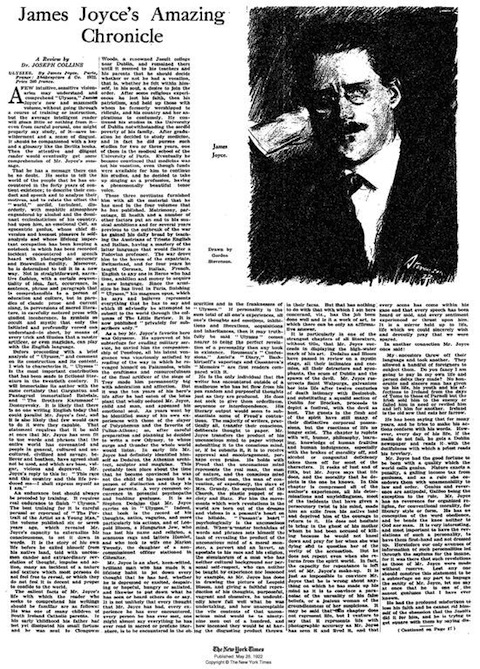
We’ve recently discussed the reactions of James Joyce’s literary contemporaries to the 1922 publication of Ulysses. T.S. Eliot was floored, and told all of his friends, including Virginia Woolf. Woolf wrestled with the book and either found it too dull or too overwhelming to finish. Whatever the reaction, Joyce’s peers took notice. But what did people who weren’t soon to be the subject of thousands of dissertations think? Of the few non-modernist masters who read Joyce, his first professional critics offer evidence. Take the review of Dr. Joseph Collins in The New York Times (above—see the full text here). Collins begins with a very prescient statement, one most readers of Joyce will likely agree with in some part:
Few intuitive, sensitive visionaries may understand and comprehend “Ulysses,” James Joyce’s new and mammoth volume, without going through a course of training or instruction, but the average intelligent reader will glean little or nothing from it- even from careful perusal, one might properly say study, of it- save bewilderment and a sense of disgust. It should be companioned with a key and a glossary like the Berlitz books. Then the attentive and diligent reader would eventually get some comprehension of Mr. Joyce’s message.
Collins then goes on to praise Joyce’s greatness in no uncertain terms:
Before proceeding with a brief analysis of “Ulysses,” and a comment on its construction and content, I wish to characterize it. “Ulysses” is the most important contribution that has been made to fictional literature in the twentieth century. It will immortalize its author with the same certainty that Gargantua and Pantagruel immortalized Rabelais, and “The Brothers Karamazof” Dostoyevsky. It is likely that there is no one writing English today that could parallel Joyce’s feat.
Such incredibly high praise it sounds like flattery, especially since Joyce’s book had not even weathered a few weeks among the reading public. For a more sober and careful assessment, see the great literary critic Edmund Wilson’s July, 1922 review in the New Republic. In Wilson’s ambivalent assessment: “The thing that makes Ulysses imposing is, in fact, not the theme but the scale upon which it is developed. It has taken Mr. Joyce seven years to write Ulysses and he has done it in seven hundred and thirty pages which are probably the most completely “written” pages to be seen in any novel since Flaubert.” If this seems like faint praise, it sets up some of Wilson’s “complaints” to come. And yet, “for all its appalling longueurs,” he writes, “Ulysses is a work of high genius. [It] has the effect at once of making everything else look brassy.”
Of course there were those who hated the book, like Harvard’s Irving Babbitt, who said it could only have been written “in an advanced stage of psychic disintegration.” And there were the puritans and philistines who found the novel’s scatological humor, frank depictions of sex, and near constant erotic charge a scandal. Yet it was the opinions, however qualified, of Joyce’s peers and most of his critics that moved U.S. Judge John Monro Woolsey eleven years later to rule that the book was not obscene and could be legally sold in America. Wrote Woolsey in his decision, “The reputation of ‘Ulysses’ in the literary world… warranted my taking such time as was necessary… In ‘Ulysses,’ in spite of its unusual frankness, I do not detect anywhere the leer of the sensualist.” Good thing Woolsey didn’t read Joyce’s letters to his wife.
Related Content:
James Joyce Read From his Epic Ulysses, 1924
James Joyce, With His Eyesight Failing, Draws a Sketch of Leopold Bloom (1926)
James Joyce’s “Dirty Letters” to His Wife (1909)
James Joyce’s Ulysses: Download the Free Audio Book
Josh Jones is a writer and musician based in Durham, NC. Follow him at @jdmagness


Leave a Reply